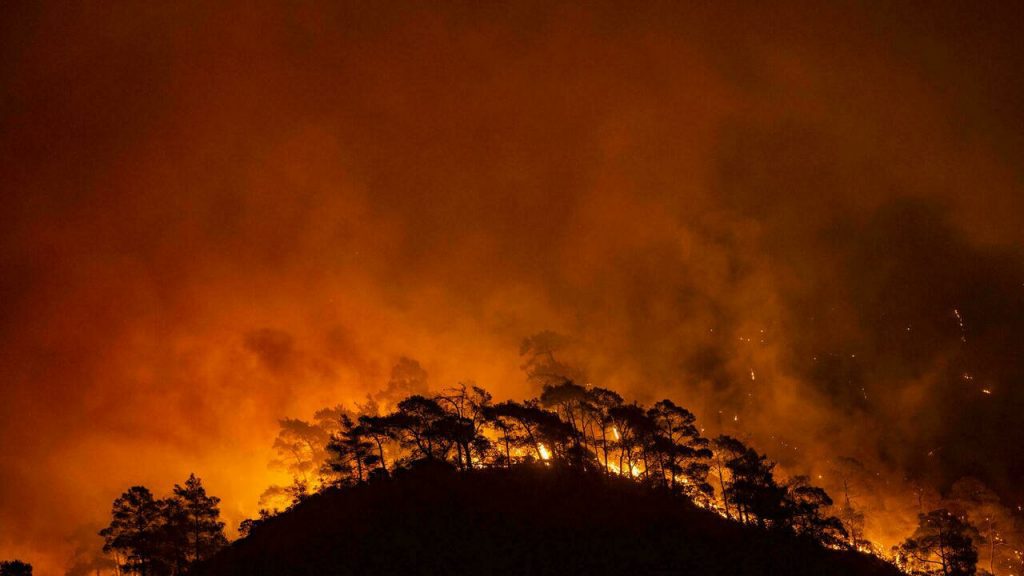While the world was caught in the blaze of the Olympics‘ glory, first Greece and now Algeria has suffered through the blazes of multiple wildfires across their landscapes.
Owed to what has been described as the worst heatwaves across Mediterranean countries in decades, the wildfires have also brought ruin and destruction across Turkey, Lebanon, and Cyprus.
Unfortunately, the worst of them has been witnessed in Algeria, where human and nature losses have been far more devastating in just two days.
Algeria is burning: what’s going on with Algeria’s wildfires?
Since last Monday, Algeria has been battling against dozens of separate fires across its northern region, perhaps its worst natural disaster in dozens of years.
A total of 100 fires, though some assume, even more, have been raging across 17 Algerian provinces, Algeria’s Press Service has reported.
Particularly affected is the mountainous, forest-like region of Kabyle, just 100 kilometers east of the capital, Algiers, where 42 people were killed on Tuesday only and 23 more today.
This death toll number includes 37 civilians and 28 military army soldiers deployed to help put out the fire.
Even more, soldiers have been severely injured, whether while extinguishing the flames or before the evacuation of civilians whose houses were also burnt and irrevocably lost.
The North African country has sought out the help of its friends and neighbors to help speed up the extinguishing of the wildfires, said Prime Minister Ayman Benabderrahmane.
“Advanced talks with (foreign) partners to hire planes and help speed up the process of extinguishing fires,”
Algerian Prime Minister Ayman Benabderrahmane.
Despite clear scientific evidence that the wildfires are a result of the heatwave facing Mediterranean countries, the Algerian prime minister has inexplicably claimed that “only criminal hands can be behind the simultaneous outbreak of about 50 fires across several localities.”
Greece is burning: what’s happening with Greece’s wildfires?

NurPhoto | NurPhoto | Getty Images
Greece is also currently battling its most horrendous climate crisis, the harshest situation ever facing the southern European country: wildfires.
These forest fires were even referred to by Greek Prime Minister Kyriakos Mitsotakis as a “natural disaster of unprecedented proportions.”
The large wildfires, which had spread across northern towns near the Greek capital, Athens, have ravaged the Mediterranean country for seven days since last Tuesday, August 3rd. Some locals have gone as far as describing them as “apocalyptic.”
Although approximately 586 wildfires have been reported, the worst of them was on Sunday in the villages on the island of Evia, where authorities had ordered the evacuation of citizens.
Just this Sunday, more than 2,000 people were evacuated from the island by ferry as clouds of gray smoke covered the island.
Areas in the Peloponnese, including ancient Olympia, the birthplace of the Olympic Games, have also been severely affected.
Firearms’ efforts to control the blazing fires across the country have not been successful due to strong winds and high temperatures.
According to the BBC, at least two people, the Athens Chamber of Commerce president, Konstantinos Michalos, and a firefighter hit by a falling electricity pole, have been killed.
No less than 20 individuals have been injured, and over half of the island Evia has been burned.
Greek authorities have since sought out and/or received aid from several countries, including but not limited to Croatia, Cyprus, Egypt, France, Romania, Spain, Sweden, and the United States, all of whom have volunteered firefighters and sent aircraft vessels.
For example, per the instructions of the Egyptian President and Supreme Commander of the Armed forces Abdel-Fattah Al-Sisi, Egypt sent two Chinook helicopters earlier this week to Greece to aid their troops in extinguishing the forest wildfires.
Supplied with the necessary equipment and advanced systems to extinguish the fires, the two helicopters were set out on their way.
This act of friendship and cooperation in times of crisis is per the directives of Al-Sisi, who encourages such support for “all friendly countries,” as read by the Egyptian military spokesman in his statement on Saturday.
Since Sunday, the situation has been relatively contained thanks to the emergency efforts of both Greece and its fellow supportive countries.
However, Greece’s General Secretariat for Civil Protection has set warnings that fire risk will remain high for days to come.
Again, these wildfires are caused primarily by the intense heat wave raging across Europe. For example, the temperature in central Greece had exceeded 41 degrees Celsius in the past few days.
Climate change: the cause and the answer

Wildfires and heatwaves are no doubt an unfortunate but inevitable example of climate change, as well as a clear demonstration of the results of burning coal, oil, and natural gas while simultaneously cutting down trees and forests.
Droughts, floods, and storms, all of which have become much more present, are also an end product of our neglect to the words and studies of climate scientists who have warned against fossil fuel combustion.
Climate change may be the cause (and it definitely is!), but acknowledging it, slowing it down and attempting to reverse it is also the only answer—nothing else.
Blaming imaginary arsonists or accidental fires is only an act of drowning in denial, attempting to delay the admission of the current reality.
Our Earth has already become warmer by 1.2 degrees Celsius since the time the industrial era began.
Unless governments and multi-national, billion-dollar corporations take action and cut carbon emissions and fuel burning, temperatures will continue on its upward path until the whole world burns, and no one would be able to revive its ashes.





